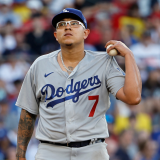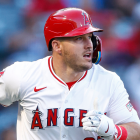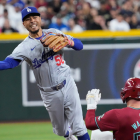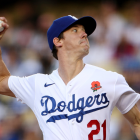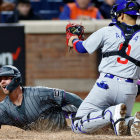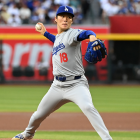Thanks to the second wild-card spot, more teams are in contention these days than ever before. Or maybe I should say more teams think hey're in contention than ever before. Some clubs face improbable odds to get to October, yet they stick to it and behave like true contenders through the second half anyway.
That's good for baseball overall. More meaningful games means more excitement. That said, the second wild card can be bad for the trade deadline, because fewer clubs are willing to sell off pieces in late July. They all want to keep their guys and try to make a run in the second half. That generally makes the trade deadline a seller's market. It's simple supply and demand. The demand always exists, but with fewer teams willing to sell, there's not much supply, so prices go up.
Wednesday we looked at 19 clubs that could be considered possible buyers at the trade deadline. 19! Now let's flip the script and look at possible sellers. I count 13 of them. Yes, there are some teams on the fence that could go either way at the deadline, which is why we listed them as a possible buyer Wednesday and a possible seller Thursday. Let's break down those 13 possible sellers and their biggest trade chips. The clubs are listed alphabetically.
 Atlanta Braves
Atlanta Braves
Record: 31-58 (-107 run differential)
Postseason Status: 22 1/2 games back in NL East, 16 1/2 games back of wild-card spot
Trade Deadline Status: Definite Seller
In Julio Teheran, the Braves have by far the best available starting pitcher at the deadline. Best available in terms of production (2.96 ERA and 138 ERA+), age (25) and contract status (owed $39 million through 2020). Teheran is a long-term building block, not a rental, and that makes him very valuable. It also makes him worth keeping if you're the Braves, which only increases their leverage in trade talks.
Atlanta's best trade chip after Teheran is closer Arodys Vizcaino, who is probably someone the Braves should look to move sooner rather than later given his long history of arm injuries. Vizcaino is excellent and would net a big return by reliever standards. Erick Aybar and Jeff Francoeur are role players without much trade value, but could be of use to contenders. Dealing them would be more about opening a roster spot for young player than getting something nice back in return. Expect to hear lots of Braves chatter in the coming weeks thanks to Teheran and Vizcaino.
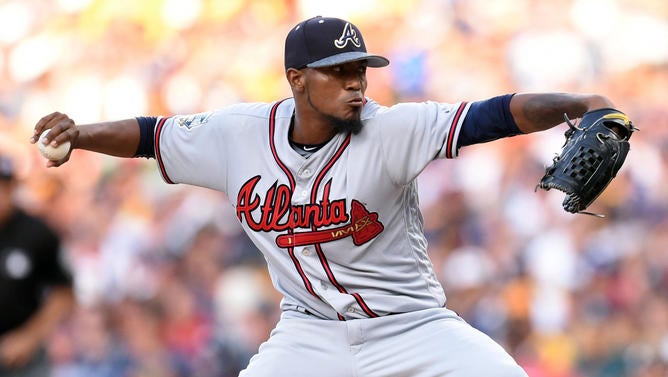
 Arizona Diamondbacks
Arizona Diamondbacks
Record: 38-52 (-54 run differential)
Postseason Status: 19 games back in NL West, 10 games back of wild-card spot
Trade Deadline Status: Likely Seller
The D-Backs came into the season hoping to contend in the NL West, and when that didn't happen, they shifted gears and traded away veteran closer Brad Ziegler. Props to them for being decisive. More trades figure to be coming, but don't expect them to be of the overhaul variety. They're not going to trade Paul Goldschmidt to kick start a rebuild or anything like that. Expect the D-Backs to tweak the roster in hopes of making a run next year.
With Ziegler gone, Arizona's best remaining trade chips are relievers Daniel Hudson and Tyler Clippard. Utility man Chris Herrmann may garner some interest too given his uncharacteristically huge year at the plate (123 OPS+). Once Rubby De La Rosa is healthy, the D-Backs will have six starters for five spots, plus top prospect Braden Shipley in Triple-A. Would they make Robbie Ray or Patrick Corbin available? The upcoming free agent class is weak. Anyone in need of pitching is going to look at trades. Guys like Ray and Corbin could bring surprisingly big returns.
 Cincinnati Reds
Cincinnati Reds
Record: 32-57 (-154 run differential)
Postseason Status: 21 1/2 games back in NL Central, 15 1/2 games back of wild-card spot
Trade Deadline Status: Definite Seller
Last deadline the Reds reportedly came close to trading Jay Bruce to the Mets, then, in spring training, they reportedly came close to sending him to the Blue Jays in a three-team trade with the Angels. Bruce is still with the Reds, and the fact he's having a nice bounceback season (122 OPS+) and has potentially another year on his contract ($13 million club option for 2017) makes him a nice trade chip. There figures to be a bunch of outfielders available at the deadline, but few offer Bruce's left-handed power.
Cincinnati's other top trade piece is shortstop Zack Cozart, who's an elite defender at short and is having his second straight good season at the plate (109 OPS+ from 2015-16). Cozart will remain under team control through next season as an arbitration-eligible player, so he's not a rental. Any team in need of a shortstop is going to look to the Reds first. Bruce and Cozart will be two of the most prominent names discussed this trade season.
 Colorado Rockies
Colorado Rockies
Record: 40-48 (-14 run differential)
Postseason Status: 16 games back in NL West, seven games back of wild-card spot
Trade Deadline Status: Definite Seller
Is this the year Carlos Gonzalez finally gets traded? The Rockies finally took the plunge and traded Troy Tulowitzki last year, so maybe! CarGo is having another excellent season (123 OPS+) and while he's owed approximately $28 million through next season, that seems like something that can be worked out. The question, as always, is his bat outside Coors Field. Gonzalez is hitting .360/.400/.707 at home and .279/.337/.413 on the road this season. That huge split will undoubtedly give some teams pause when mulling a trade.
Rental role players Mark Reynolds, Daniel Descalso, and Ryan Raburn could be attractive bench options to contenders. That said, those types of players typically bring back cash or a player to be named later, not legitimate prospects. Closer Jake McGee is having such a poor year (6.12 ERA and career low 6.8 K/9) that selling him for pennies on the dollar makes no sense. The Rockies are best off keeping him and hoping he rebuilds value in the second half so they flip him in the offseason. CarGo's the big prize here, assuming Colorado decides to go ahead and trade him. The Rockies also have some potential useful bench options to offer as well.
 Los Angeles Angels
Los Angeles Angels
Record: 37-52 (-20 run differential)
Postseason Status: 16 1/2 games back in AL West, 13 games back of wild-card spot
Trade Deadline Status: Likely Seller
The Angels are in a tough spot. The team is very bad and there's not enough help coming from the farm system. In most cases like this, a total rebuild is in the order. The Angels also happen to employ the best player on the planet though, and they'll have him through 2020. I understand why folks say the Halos should trade Mike Trout to kick start their rebuild. I get it. I just think it's a heck of a lot easier to rebuild a farm system than it is to have the best player in the world for his age 24-28 seasons. Building around Trout makes more sense than building without Trout to me.
Aside from Trout, pretty much everyone on the roster should be available. Should be and will be are two different things though. I don't believe new GM Billy Eppler would put prized offseason pickup Andrelton Simmons on the trade market, and I suppose that's a smart move. Elite defenders at short who are still only 26 are hard to find. Yunel Escobar and veteran arms Hector Santiago, Joe Smith, and Huston Street are the Angels' best and most realistic trade chips. A Kole Calhoun trade would surprise me, though I suppose we can't rule it out. The Angels need a lot of help. They'd be foolish not to listen on anyone.
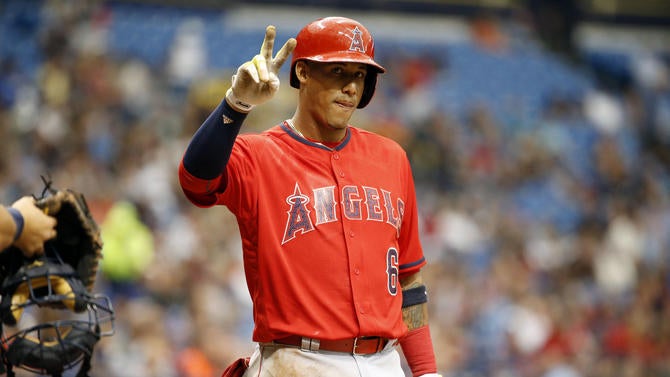
 Milwaukee Brewers
Milwaukee Brewers
Record: 38-49 (-76 run differential)
Postseason Status: 14 1/2 games back in NL Central, 8 1/2 games back of wild-card spot
Trade Deadline Status: Definite Seller
It's possible, if not likely, Jonathan Lucroy will be the best player traded at the deadline this year. He's having a very good season (124 OPS+), he plays a premium position and he plays it well, and he'll make only $7.25 million through next season. It's an absurdly team friendly contract that fits into any team's budget. Lucroy's market is not limited to 2016 contenders. He's someone you can pick up even if you're out of it because he can help you in 2017. Lucroy should net the Brew Crew a huge return.
Beyond Lucroy, the Brewers have good trade chips in first base masher Chris Carter and end-game relievers Will Smith and Jeremy Jeffress. Teams are shying away from one-dimensional sluggers, so Carter may not bring much back in a trade. The Brewers could hold onto him. Smith and Jeffress will be in high demand. No doubt about that. Ryan Braun? Well, I think the Brewers would love to dump the $90 million or so left on his contract, but Braun seems to be persona non grata around the league. Lucroy, Smith, and Jeffress are the big names to watch here. The Brewers will be a major player at the deadline.
 Minnesota Twins
Minnesota Twins
Record: 32-56 (-71 run differential)
Postseason Status: 20 games back in AL Central, 17 1/2 games back of wild-card spot
Trade Deadline Status: Definite Seller
As the trade deadline draws closer, the more I think Ervin Santana will be one of the top starters dealt. He's having a decent season (4.06 ERA and 106 ERA+) and I don't think the Twins would mind getting out of the $35 million left on his contract. The upcoming free agent pitching class is putrid. Santana represents an opportunity to get out ahead of the market and secure a veteran starter on a reasonable contract. Lefty reliever Fernando Abad has come back to Earth of late, but lefty bullpen help is always on demand, and Minnesota would be foolish not to cash Abad in as a trade chip after signing him to a minor league deal over the winter.
 New York Yankees
New York Yankees
Record: 44-44 (-34 run differential)
Postseason Status: 7 1/2 games back in AL East, 5 1/2 games back of wild-card spot
Trade Deadline Status: Possible Seller
The Yankees are one of two teams we listed as both a possible buyer and a possible seller. Selling isn't in this franchise's DNA, but they've been sitting around .500 all season, and they don't seem capable of making the sort of run necessary to get back into the playoff race. GM Brian Cashman is reportedly ready sell. It's just up to ownership to give the thumbs up.
Should the Yankees decide to sell, they'll have three premium trade chips: Aroldis Chapman, Andrew Miller, and Carlos Beltran. Chapman and Beltran are rentals while Miller is signed affordably though 2018. High-end relief is always in demand, and pretty much every contender will check in on Chapman and Miller. I'm talking about the Giants, Dodgers, Cubs, Nationals, Mets, Red Sox, Indians, Rangers, Astros, and more. Beltran might be the best veteran run producer available at the deadline too. The Yankees have some decent secondary pieces to market (Michael Pineda, Brett Gardner, Ivan Nova), though Chapman, Miller, and Beltran are the big prizes.
 Oakland Athletics
Oakland Athletics
Record: 38-51 (-69 run differential)
Postseason Status: 15 1/2 games back in AL West, 12 games back of wild-card spot
Trade Deadline Status: Likely Seller
The A's are always in buy and sell mode. They're an opportunistic team that looks to add and subtract at all times in an effort to stay competitive. Oakland is not in contention and has a Grade-A trade chip in Josh Reddick, who represents the best available two-way outfielder at the deadline. He's a rental and extension talks with the A's have gone nowhere. Any contender with an outfield opening -- that means the Red Sox, Nationals, Dodgers, Giants, Royals, Cardinals, among others -- will check in.
The other big chip is Danny Valencia, who has quietly hit .296/.350/.510 (133 OPS+) in 653 plate appearances since the start of last season. He's under team control through next season, so the A's figure to set the price high. Valencia's an under-the-radar impact bat capable of playing both corner infield spots, and even some left field. More than a few clubs would like to get their hands on him. The Astros make a lot of sense given their season-long holes at first base and DH.
Never say never, but I don't think the A's will move Sonny Gray at the deadline. He's not having a good year and he's been banged up, and they'd be selling low. I'm sure other teams will make offers, good ones too, but not as good as what a healthy and effective Gray would fetch. I expect him to stay put through the deadline. Sean Doolittle, Ryan Madson, Marc Rzepczynski, and Jed Lowrie are secondary A's trade chips.
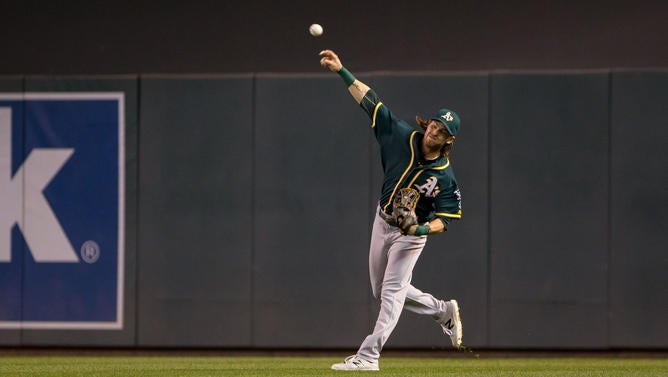
 Philadelphia Phillies
Philadelphia Phillies
Record: 42-48 (-87 run differential)
Postseason Status: 12 games back in NL East, six games back of wild-card spot
Trade Deadline Status: Definite Seller
At this point the cupboard is mostly bare. The Phillies are in the middle of a massive rebuild and the only big name veteran left on the roster is Ryan Howard. They've been trying to deal him for years with no luck. Philadelphia's best trade chip this deadline is Jeremy Hellickson, who is having a solid year (3.92 ERA and 107 ERA+) and is due to become a free agent after the season. Veteran utility man Andres Blanco would surely interest some clubs, as would various relievers. Closer Jeanmar Gomez is the most notable bullpen arm. The Phillies have just about completed the "sell off" portion of their rebuild. Now they're focused on incorporating all that young talent they've acquired into the big league roster.
 San Diego Padres
San Diego Padres
Record: 38-51 (-48 run differential)
Postseason Status: 18 1/2 games back in NL West, 9 1/2 games back of wild-card spot
Trade Deadline Status: Definite Seller
To use the words of team chairman Ron Fowler, the Padres are "miserable failures." GM A.J. Preller has already started the process of picking up the pieces by trading Joaquin Benoit, Craig Kimbrel and James Shields since the start of the offseason. He would love to move Matt Kemp too, but with a .275 OBP, two arthritic hips and roughly $64 million owed to him through 2019, Preller is probably stuck with him.
San Diego's best trade chip, righty Tyson Ross, started Opening Day and has been on the DL since with a shoulder issue. He's under team control next season, so keeping him and letting him rebuild value once healthy makes way more sense than selling super low at the deadline. Melvin Upton Jr. has played well enough to generate interest, though the Padres are probably going to have to eat some money to make it happen. Yangervis Solarte and Andrew Cashner are solid secondary trade chips too. Expect the Padres to stay busy at the deadline. Trading Benoit, Kimbrel and Shields were only the first steps in this process.
 Seattle Mariners
Seattle Mariners
Record: 45-44 (+51 run differential)
Postseason Status: 8 1/2 games back in AL West, five games back of wild-card spot
Trade Deadline Status: Possible Seller
The Mariners are the other team we've listed as both a buyer and a seller. They aren't out of it, but five teams stand between them and the second wild-card spot. Getting Taijuan Walker (foot) and Felix Hernandez (calf) back ASAP would obviously help their postseason chances. Should they be unable to get back into the race and decide to sell, it figures to be more of a retooling than an overhaul. They plan to win next year. Seattle's most marketable pieces may be platoon outfielders Seth Smith and Franklin Gutierrez. Unloading the underperforming Wade Miley could be a goal, though new GM Jerry Dipoto has been a fan of Miley dating back to their days with the D-Backs. Point is, if the Mariners do sell, they're unlikely to completely tear everything down and make blockbusters. A series of smaller moves is more likely.
 Tampa Bay Rays
Tampa Bay Rays
Record: 34-54 (-74 run differential)
Postseason Status: 17 1/2 games back in AL East, 15 1/2 games back of wild-card spot
Trade Deadline Status: Definite Seller
A miserable 3-22 stretch to close out the first half has dropped the Rays out of the postseason race completely. There are already rumblings that they're ready to discuss their starting pitchers in trades, namely Jake Odorizzi, Matt Moore and Drew Smyly. I'm sure Chris Archer is available at the right price too, though he's a) having a down year and they might not want to sell low, and b) signed affordably through 2021.
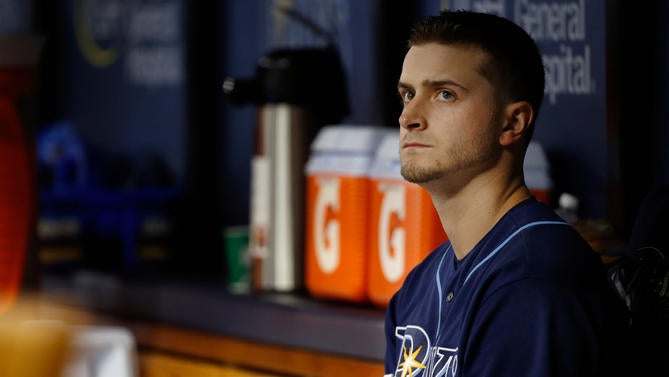
Would the Rays trade Evan Longoria? I'm sure they would listen to offers. It's not hard to envision a Longoria-to-Dodgers scenario given the ties (Dodgers president of baseball operations Andrew Friedman drafted Longoria when he was with the Rays), the Dodgers' long-term need at third base and the prospects they have available to trade. That might be something that waits until the offseason though. Steve Pearce, Desmond Jennings, and Erasmo Ramirez are other Rays who figure to generate interest before the trade deadline.










